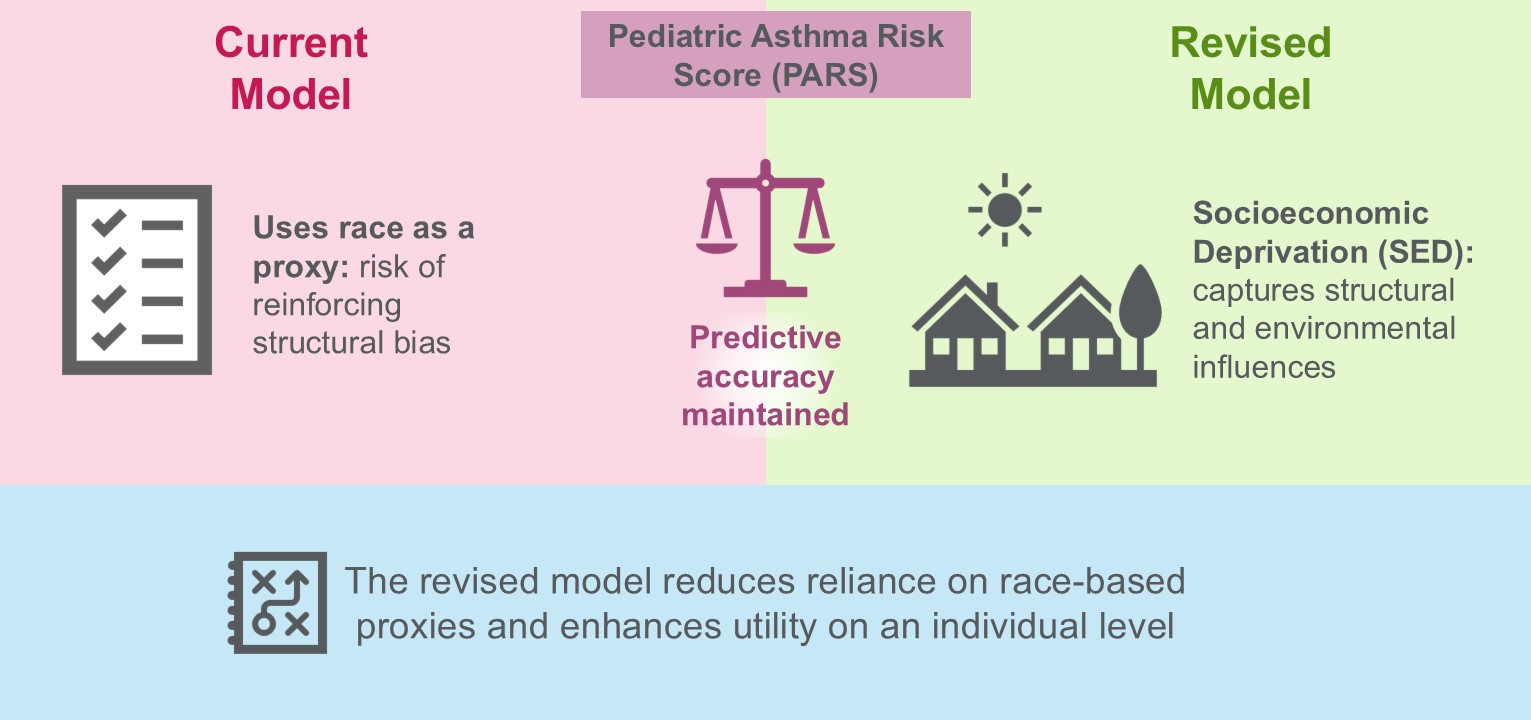Being Black with a Chronic Condition
Research By: Christine Schuler, MD, MPH | Carole Lannon, MD, MPH
Post Date: February 21, 2023 | Publish Date: Feb. 2, 2023
James M. Anderson Center for Health Systems Excellence | Top Scientific Achievement


Black patients and families seeking care for chronic conditions also carry trauma from racism and burdens invisible to healthcare providers
Every child and adolescent living with a chronic condition serious enough to require repeated hospital admissions carries a heavy weight. So does every parent and caregiver who loves them.
For many Black families, however, the healthcare setting comes with the extra burdens of implicit bias and structural racism that are often invisible to healthcare providers.
Tawanna Williams, the mother of a child with severe congenital heart disease, describes the all-too-common experience: “It’s the trauma of having a medically fragile child, it’s the trauma of just being a Black individual in the world today. We carry around trauma.”
An article co-written by patients, families, and care providers published online in February in the Journal of Hospital Medicine highlights a number of the healthcare challenges and inequities that Black families face and outlines several focused and intentional efforts to address the issues.
The study, “The impact of being Black on living with a chronic condition: Inpatient perspectives,” grew out of a panel discussion for The Roadmap Project about the experiences of Black patients in the hospital. In addition to Williams, study co-authors included three other members of the Roadmap Patient and Parent Advisory Committee: Robyn Kinebrew, Christian Lawson, and LaToshia Rouse.
The Roadmap Project, launched by the American Board of Pediatrics (ABP), is led by Carole Lannon, MD, MPH, of the James M. Anderson Center for Health Systems Excellence at Cincinnati Children’s. The project is part of the ABP’s strategic initiative to improve pediatric mental health, with Roadmap focused on the emotional health in children and youth with chronic conditions and in their families.
In addition to focusing on the well-being of their hospitalized child, many Black families feel they must ensure that hospital staff feel comfortable.
“I’m trying to talk a certain way, dress a certain way, be a certain way so that staff find us acceptable and feel comfortable talking with us. It is exhausting trying to deal with bias on top of worrying about your son’s health and care,” says Robyn Kinebrew, the mother of twins with sickle cell disease. “It was hard to let my guard down. I always knew that I had to be strong.”
Co-author Christine Schuler, MD, MPH, Division of Hospital Medicine at Cincinnati Children’s, says: “This paper is so important for clinicians like me to read. In the hospital setting, the pace is fast, the kids are sick, and there are so many things happening all at once. These stories show what is happening for Black families behind all the noise of inpatient stays.”
How Hospital Experiences Can Differ
The article highlights several commonly experienced themes among Black families receiving hospital care:
- Carrying trauma from past and current events.
- Code switching. Many Black families feel pressure to change how they speak and what they wear to appear less “threatening.”
- Fear of Child Protective Services (CPS) intervention. Many Black families fear the emotions they express as their children face serious illness can be too easily misinterpreted as aggression and that, as a result, they may be judged as potentially unsafe to care for their own children.
“This paper highlights the voices of lived experience and shares actionable strategies that clinicians, divisions, and health systems can make to address racism and ensure equitable care and support for Black families during hospitalization,” Lannon says.
Among the strategies discussed by the co-authors:
- Incorporating educational opportunities that use accurate data and patient stories to raise awareness of inequities and deepen understanding of the lived experience of Black families.
- Making deliberate efforts to establish trust and recognize when current events that represent racial attacks may influence the emotional state of the patient and family.
- Addressing system issues, such as using race-blind guidelines for social work or CPS referrals.
What’s next?
LaToshia Rouse, the mother of triplets born prematurely and a former NICU family advisor, sees awareness building as an important first step.
“When we (Black families) walk into a healthcare setting, there is a sense that we need to cover ourselves. My hope is that with greater awareness, we can begin to be seen as partners by our healthcare systems and healthcare providers,” Rouse says. “Let’s build bridges with strategy and action.”
Lannon and Schuler say this publication dovetails with Cincinnati Children’s ongoing efforts to draw attention to and systematically eliminate inequities.
“Collectively learning from these perspectives is one step forward toward eliminating disparities and inequities,” Lannon says.
More information
- Watch a video of the panel discussion (45 minutes)
- Learn more about the Roadmap Project
More 2023 Research Highlights
Chosen by the James M. Anderson Center for Health Systems Excellence
Schneider P, Lorenz A, Menegay MC, et al. The Ohio Maternal Safety Quality Improvement Project: initial results of a statewide perinatal hypertension quality improvement initiative implemented during the COVID-19 pandemic. Am J Obstet Gynecol MFM. 2023;5(6):100912. doi:10.1016/j.ajogmf.2023.100912
Bates KE, Madsen NL, Lyren A, et al. Framework to optimise learning network activities for long-term success. BMJ Qual Saf. Published online July 27, 2022. doi:10.1136/bmjqs-2021-014463
Matula KA, Minar P, Daraiseh NM, Lin L, Recker M, Lipstein EA. Pilot trial of iBDecide: Evaluating an online tool to facilitate shared decision making for adolescents and young adults with ulcerative colitis. Health Expect. 2022;25(6):3105-3113. doi:10.1111/hex.13618
Kappelman MD, Wohl DA, Herfarth HH, et al. Comparative Effectiveness of Anti-TNF in Combination With Low-Dose Methotrexate vs Anti-TNF Monotherapy in Pediatric Crohn’s Disease: A Pragmatic Randomized Trial. Gastroenterology. 2023;165(1):149-161.e7. doi:10.1053/j.gastro.2023.03.224
Kinebrew VR, Lawson C, Rouse L, Williams T, Schuler CL, Lannon C. The impact of being Black while living with a chronic condition: Inpatient perspectives. J Hosp Med. 2023;18(9):856-859. doi:10.1002/jhm.13059
View more discoveries from 50 research divisions and areas
Return to the 2023 Research Annual Report main features
| Original title: | The impact of being Black while living with a chronic condition: Inpatient perspectives |
| Published in: | Journal of Hospital Medicine |
| Publish date: | Feb. 2, 2023 |
Research By

In my research, I collaborate with a range of clinicians and researchers to improve the care of hospitalized children, including those admitted to the hospital for acute and chronic illnesses.

Identifiable gaps in health outcomes piqued my research interests. I now work with patients, families, clinicians and researchers to improve care and outcomes for children and families using learning health networks. These networks, used for improvement and research, can accelerate population health outcomes at scale.







